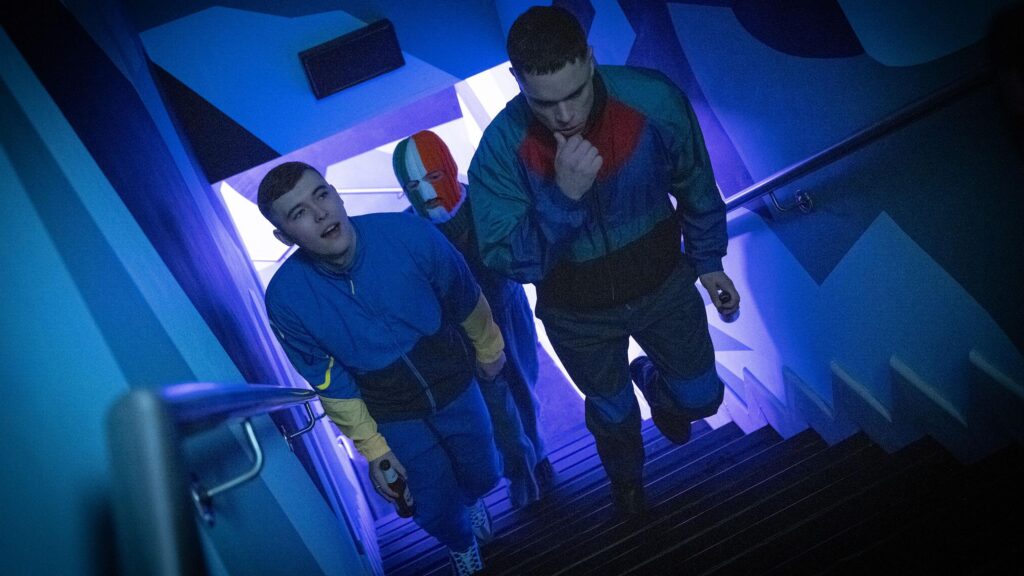Kneecap Review

Almost ready to jump out of the screen with its wild energy, “Kneecap” is a drug-fueled riot for freedom that connects political substance and crowd-pleasing entertainment. Liam Óg Ó hAnnaidh, Naoise Ó Cairealláin and JJ Ó Dochartaigh the three members of the titular Irish rap group star as themselves in this loosely fictionalized retelling of their origin story set in Belfast, Northern Ireland.
At the foundation of the trio’s artistic ethos is their use of the Irish language (often referred to as Irish Gaelic), which writer-director Rich Peppiatt (a Brit) honors. The island’s ancient native tongue once banned by the British and only recognized as an official language in the U.K. in 2022 is intrinsically linked to the identity of colonized Irish people, often serving as a symbol for their enduring culture and resistance against British imperialism.
Oscar-nominated “The Quiet Girl,” a gentle drama in Irish, was born out of Ireland’s state-funded attempts to use film as a means to promote and preserve a language spoken by 80,000 people. With an anarchic sensibility sure to raise eyebrows or ruffle feathers, “Kneecap” joins a growing batch of titles that are slowly assembling a cinematic archive of stories told through the medium of Irish.
When they’re not throwing darts at Margaret Thatcher’s face, childhood best friends Liam (also known as Mo Chara) and Naoise (stage name Móglaí Bap) make money selling various drugs purchased on the deep web. The son of an assumedly dead high-ranking Irish Republican Army (IRA) member for whom speaking Irish was nearly as impactful symbolically as blowing up cars during the Troubles were literally, Naoise has revolution and resentment coursing through his veins. Just as much of an Irish patriot, Liam feels torn over his sexual relationship and eventually romantic involvement with a Protestant girl.
The duo is charismatic in the way that people who are more than just obscenely high can be; they rap. Their polemical verses, mostly in Irish but with some lines in English sprinkled throughout, overflow with the juvenile hedonism of sexual conquests and copious drug use while also spewing rebelliousness against authority. With a cheeky irreverence somewhat reminiscent of “Trainspotting,” Peppiatt has Liam narrate his wonderfully eccentric docudrama, treating reality as if it were flexible by means of fantastical sequences that illustrate the boys’ never-ending drug trips.
Liam encounters JJ one night when he gets in trouble with the law; JJ is an easygoing Irish language teacher who shares their values and takes it upon himself to put music to their tracks, becoming Kneecap’s third member. On stage, JJ becomes wild DJ Provaí, wearing a balaclava that displays the colors of the Irish flag to conceal his identity but also prominently featuring his exposed backside emblazoned with the slogan “Brits Out.”
From start to finish pure wattage, “Kneecap” features fittingly frenetic animated touches including an MTV-ready claymation interlude as it charts the artist’ move from empty local bars to sold-out venues through surrealistic effervescence. As for antagonists: The rowdy youths find themselves caught between a cop (Josie Walker) hell-bent on proving Naoise’s dad didn’t die and run-ins with the R-RAD (Radical Republicans Against Drugs), a paramilitary group on the same political team but not too keen about illegal substances.
While not all visual components in Peppiatt’s varied bag of tricks are original (the fast forwards look like VHS), there’s gutsy charm enough in the charged performances of rappers turned actors, and Ryan Kernaghan’s wildly shape-shifting cinematography even as the film barrels toward an expectedly uplifted ending to cut it some slack.
“Belfast,” by comparison, is fangless and too sweet; Kenneth Branagh’s film is set in the 1960s during Northern Ireland’s Troubles, but Peppiatt’s comedy wrapped in ideological barbed wire feels much more subversive (a shot of a Palestinian flag hanging from a balcony confirms where the Irish allegiance lies). Irish history buffs may pick up on digs at Irish hero Michael Collins or a quick hallucination gag with politician Gerry Adams’ face. But if you don’t get those jokes, it won’t ruin your good time at this still-jolting riot.
Michael Fassbender plays Naoise’s father Arlo who shouldn’t miss that reference to the IRA leader he played in Steve McQueen’s “Hunger” with limited screen time but great narrative importance for his knowledge that Kneecap’s controversial rise to fame and large following could mean a resurgence of pride in spoken Irish. Because to keep a language alive it must be part of the culture now, and not only a remnant of bygone eras. Their music has the power to inspire those their age to learn it, to pass it on.
“Kneecap” is as funny as it is thought-provoking, this movie is about passing the baton in an ongoing fight for the salvation of the Irish language, which fights for recognition with every breath against English within its own borders. The catchy rap tunes of this trio move that battle from being fought out on street corners during days of extremism, to being fought out in the realm of influential pop culture soft power that can penetrate society without claiming any more lives. Because if every word in Irish is a bullet to the heart of the oppressor, as the adage suggests, then these Kneecap lads are spitting an explosive barrage with every breath.
Watch Kneecap For Free On Gomovies.
.jpg?w=1024&resize=1024,1024&ssl=1)
.jpg?w=1024&resize=1024,1024&ssl=1)
.jpg?w=1024&resize=1024,1024&ssl=1)
.jpg?w=1024&resize=1024,1024&ssl=1)
.webp?w=1024&resize=1024,1024&ssl=1)
.jpg?w=1024&resize=1024,1024&ssl=1)
.jpg?w=1024&resize=1024,1024&ssl=1)
.jpg?w=1024&resize=1024,1024&ssl=1)